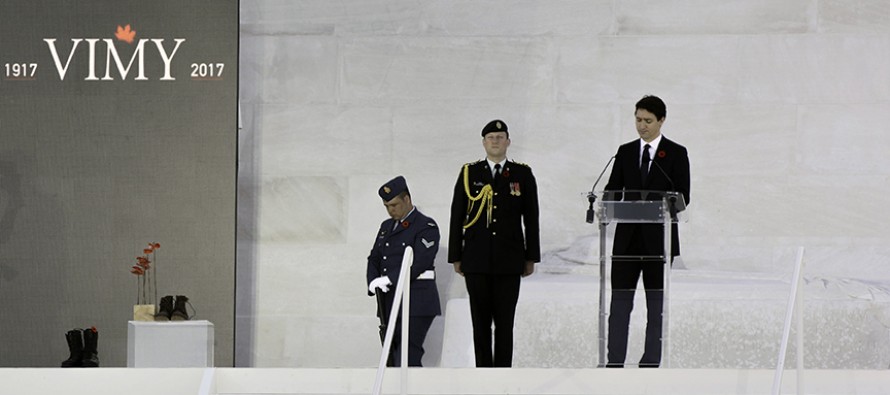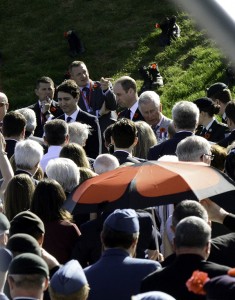Birth of a nation – Commemorating war and sacrifice


Prime Minister Justin Trudeau (left), Prince William (centre) and Prince Charles (right) greet a crowd of about 25,000 as they arrive to commemorate the 100th anniversary of the Battle of Vimy Ridge at the Canadian National Vimy Memorial in France. In contrast to the sun and warmth of the commemorative event soldiers going into battle on Easter morning April 9, 1917 faced a morning of snow and sleet.
By David Lafreniere
When it looked like there was no more room they kept coming until about 25,000 people stood shoulder to shoulder to commemorate and honour those who defined a nation 100 years ago.
It was sunny and warm as dignitaries arriving to a 21-gun salute inspected the Canadian Armed Forces military contingent on parade. The small contingent represented the four divisions that fought together for the first time as the Canadian Corps at the battle of Vimy Ridge. The battle took place on a snow and sleet-filled Easter morning April 9, 1917. The four-day battle was a rare victory in an otherwise dismal Arras offensive.
Biancia Resar, a student at Donald A. Wilson High School in Whitby, Ont. was at Vimy with her school group. She said they all came together and did assemblies and fundraising in order to get to France for the Vimy commemoration. It was a visit to the trenches and grave sites of the Canadian fallen that had the greatest impact on Resar.
“When we went to see the trenches covered over with the grasses it made the experience more real,” said Resar. “I wish I could see the stories of every person, but even just reading the tombstones, it was amazing.”
Replica world war one planes flew over the memorial on an escarpment that dominates the terrain between the French towns of Arras and Lens. The Germans held the high ground against two previous attacks by the British and French in 1915 and 1916. Through training and preparation, the Canadian Corps would take the Ridge and raise the status of Canada on the world stage.
In recognition of the 7,004 Canadians who were wounded in the battle and the 3,598 Canadians who died their Royal Highnesses, The Duke of Cambridge and Prince Harry placed army boots with poppies in a place of prominence on the memorial.
Considering Canada’s population in 1917 was just eight million it is even more incredible to realize that the country fielded a force for this battle of 100,000 men. Many on site stopped to think and reflect on the enormity of the sacrifice and the price they paid.
Remarks by officials on the significance of the battle and sacrifice of those who fought were intermixed with moving musical tributes and actors identifying as soldiers from the battle and reading aloud their letters.
Following hymns, David Johnston, Governor General of Canada and Canada’s Commander-in-Chief said the explosion of more than 100 artillery pieces shook the morning air.
He said victory was achieved through incredible struggle, determination and bravery. It was months of careful planning and surveillance, according to Johnston. It was also technological and social innovation in warfare and learning the hard lessons of war.
“One hundred years later we honour their eternal sacrifice,” said Johnston. “Behind me extending high into the sky above behold the towering twin pilons of the Vimy monument. See how they sore so boldly. Those spires stand for peace and for freedom. They stand for justice and hope. They remind us that one cannot exist without the other.”

Prime Minister Justin Trudeau addresses a crowd of about 25,000 at the Canadian National Vimy Memorial marking the 100th anniversary of the Battle of Vimy Ridge in Vimy France on Sunday, April 9, 2017. Of the 100,000 men who came together to fight for the first time as a Canadian Corps of four divisions more than 10,500 where wounded or killed in the four days of battle.
Prime Minister Justin Trudeau said the monument is also symbolic to Canada’s birth and our enduring commitment to peace.
“To the grace of the ones who stood by their friends through unimaginable hardship, through death itself,” said Trudeau. “And who in that offering stood by their country and made their country in its beginnings. They were Canadians and they were valiant beyond measure. Honour them.”
There were hundreds of thousands of Canadians who crossed the Atlantic to fight in the First World War. Prince Charles said they took a stand against tyranny and oppression and left behind everything they knew for a struggle they could not have imagined. He said it is hard today to believe the horrors of war are possible.
“Boot deep mud rendered each step a struggle against a deadly relentless hail of bullets,” he said. “They fought bravely and with great ingenuity… however victory came at an unbearably heavy cost. This was and remains the single bloodiest day in Canadian military history.
Canadians displayed a strength of character and commitment to one another that is still evident today, according to the Prince. He said Vimy represented Canada at its best and “embodied the true north strong and free.”
The Vimy monument recognizes the 11,285 of the nearly 61,000 who were killed in France and have no known grave. The number of wounded throughout the war was about 172,000.


